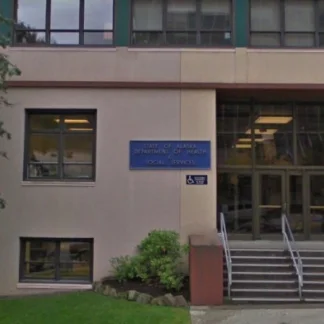Bartlett Regional Hospital
Bartlett Regional Hospital, in Juneau, Alaska, offers comprehensive mental and b...
Alaska DHSS–Division of Behavioral Health, in Juneau, Alaska, provides comprehensive mental health and addiction recovery services for youth and adults, including specialized programming for children, adolescents, young adults, pregnant and postpartum women, and persons with co-occurring disorders. Their services include crisis intervention and patient stabilization, medically supervised detox, medication assisted treatment (MAT), and inpatient, outpatient, and aftercare programs.
Clients undergoing medical detox receive robust clinical supervision and may be prescribed FDA-approved medications to ease withdrawal symptoms and prevent complications. Those in alcohol and/or opioid recovery may enroll in their evidence-based MAT program for longer-term pharmacotherapy using methadone, buprenorphine, naltrexone, and/or naloxone.
Their inpatient programs are designed for clients who require high-level structure and support, including those in early recovery or at an elevated risk of relapse. Clients receive medical and mental health assessments, personalized care plans, and case management. They also engage in intensive individual, group, and family counseling and age-specific, recovery-focused life skills training.
Their outpatient programs encompass multiple levels of care aligned with clients’ evolving needs and include continuing addiction counseling, recovery education, and related services.
Their aftercare programs enable complete, wraparound care and may include 12 step program facilitation, transitional support, housing and employment assistance, academic and vocational training, and referrals for additional services.
Alaska DHSS–Division of Behavioral Health works with major insurers, such as Humana, Cigna, BlueCross BlueShield, Aetna, United Healthcare, and others. They also accept Medicare, Medicaid, military insurance, and tribal benefits. Contact your provider to verify coverage because out of network benefits can vary. Financial assistance is available.
Contact us for more information: (190) 746-5337

Connect with Alaska DHSS - Divison of Behavioral Health by calling their admissions team directly.
(190) 746-5337 Website Get DirectionsWhether a marriage or other committed relationship, an intimate partnership is one of the most important aspects of a person's life. Drug and alcohol addiction affects both members of a couple in deep and meaningful ways, as does rehab and recovery. Couples therapy and other couples-focused treatment programs are significant parts of exploring triggers of addiction, as well as learning how to build healthy patterns to support ongoing sobriety.
Research clearly demonstrates that recovery is far more successful and sustainable when loved ones like family members participate in rehab and substance abuse treatment. Genetic factors may be at play when it comes to drug and alcohol addiction, as well as mental health issues. Family dynamics often play a critical role in addiction triggers, and if properly educated, family members can be a strong source of support when it comes to rehabilitation.
Group therapy is any therapeutic work that happens in a group (not one-on-one). There are a number of different group therapy modalities, including support groups, experiential therapy, psycho-education, and more. Group therapy involves treatment as well as processing interaction between group members.
In individual therapy, a patient meets one-on-one with a trained psychologist or counselor. Therapy is a pivotal part of effective substance abuse treatment, as it often covers root causes of addiction, including challenges faced by the patient in their social, family, and work/school life.
Research clearly demonstrates that recovery is far more successful and sustainable when loved ones like family members participate in rehab and substance abuse treatment. Genetic factors may be at play when it comes to drug and alcohol addiction, as well as mental health issues. Family dynamics often play a critical role in addiction triggers, and if properly educated, family members can be a strong source of support when it comes to rehabilitation.
Group therapy is any therapeutic work that happens in a group (not one-on-one). There are a number of different group therapy modalities, including support groups, experiential therapy, psycho-education, and more. Group therapy involves treatment as well as processing interaction between group members.
In individual therapy, a patient meets one-on-one with a trained psychologist or counselor. Therapy is a pivotal part of effective substance abuse treatment, as it often covers root causes of addiction, including challenges faced by the patient in their social, family, and work/school life.
Group therapy is any therapeutic work that happens in a group (not one-on-one). There are a number of different group therapy modalities, including support groups, experiential therapy, psycho-education, and more. Group therapy involves treatment as well as processing interaction between group members.
In individual therapy, a patient meets one-on-one with a trained psychologist or counselor. Therapy is a pivotal part of effective substance abuse treatment, as it often covers root causes of addiction, including challenges faced by the patient in their social, family, and work/school life.
In individual therapy, a patient meets one-on-one with a trained psychologist or counselor. Therapy is a pivotal part of effective substance abuse treatment, as it often covers root causes of addiction, including challenges faced by the patient in their social, family, and work/school life.
Bartlett Regional Hospital, in Juneau, Alaska, offers comprehensive mental and b...
JAMHI Health and Wellness Midtown Clinic is a private rehab located in Juneau, A...
JAMHI Health and Wellness, in Juneau, Alaska, offers mental health and addiction...
Gastineau Human Services, in Juneau, Alaska, provides comprehensive mental healt...